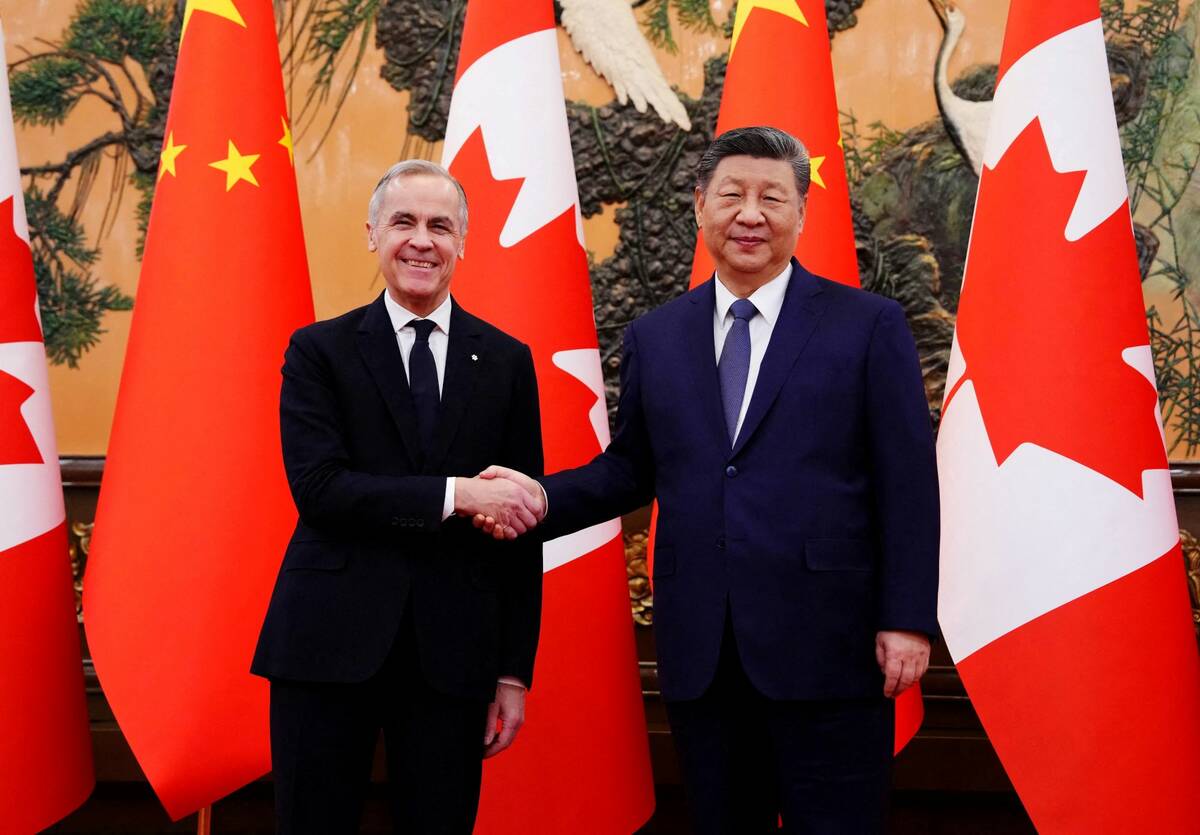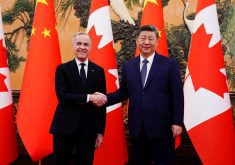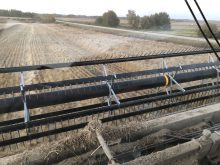The world has lost two great leaders in recent days.
First came news from Moscow of the death of Mikhail Gorbachev, the last general secretary of the Union of Soviet Socialist Republics.
Russian President Vladimir Putin’s recent bad behaviour aside, it’s difficult some days to remember just how close the geopolitical bomb he defused was to detonating.
Read Also

Pragmatism prevails for farmers in Canada-China trade talks
Canada’s trade concessions from China is a good news story for Canadian farmers, even if the U.S. Trump administration may not like it.
For a decade, the world was carved up into “The West” and the “Iron Curtain,” to borrow Churchill’s famous phrase. The two sides waged war in the shadows with everything but bullets openly flying, all as the world sat watching, in sure certainty that inevitably, there would be a nuclear war.
Into this strode a Soviet leader cut from a different cloth, with ideals that had been in many ways formed during a walk on a rural property in Canada.
The story goes that then-federal Agriculture Minister Eugene Whelan was to host then-Soviet Agriculture Secretary Gorbachev for dinner at his home in the Ontario town of Amherstville on May 19, 1983. Gorbachev, then 52, was a rising star. In 1978 he’d been tapped to head the agriculture portfolio. Two years later he was the youngest-ever full member of the Politburo. Gorbachev was only the second member of the Politburo to visit Canada.
Whelan, however, was delayed in departing Ottawa, and Gorbachev and Soviet ambassador to Canada Alexander Yakovlev filled the time with a long walk on the back of Whelan’s property.
It’s said that by the end of the walk, the two had quietly concluded that in order to succeed, the Soviet Union needed to change. Thus were sown the seeds of the glasnost policy that ultimately led to the closing of that painful chapter of global history.
Gorbachev could have clung to the corrupt and dysfunctional system that was late-stage Soviet socialism. It’s a course of action that probably would have worked out just fine for him personally, the suffering of the people of his country aside.
But as a true leader, he struck out on a new course that he hoped would deliver a better, freer and more prosperous nation, albeit at the cost of political and personal ignominy.
The fact that elements in his country prevented that dream from reaching its full bloom shouldn’t distract from the honour of that vision for better things.
Closer to home, as this publication was nearing press time, came news of the death of Queen Elizabeth, after a historic 70-year reign.
While the very concept of a monarchy may seem archaic to many in these times, Her Majesty had a way of winning over even the most skeptical.
At the heart of this ability was her obvious sense of duty and her selfless devotion to it. It had a way of overcoming even the most republican of sentiments.
Over the past couple of days, I can’t count the number of times I’ve heard some variation of this theme: “I’m not what you’d call a monarchist. But the Queen? She was all right.”
Perhaps there’s an element of not wanting to speak ill of the dead at work, but a similar sentiment had surrounded her for many years. Against all odds, she’d found a way to modernize the monarchy, and maintain in some way, even if just symbolically, its relevance in the modern world.
The two might not have much in common on the surface, but I’d argue there are important similarities – mainly the ability to consider other views than the one they currently held, and build bridges to make changes that most would think impossible.
Back when Gorbachev was strolling in rural Canada, few would have thought that just three years later he would be sitting across the table from Ronald Reagan at a series of summits. The result was a historic disarmament treaty that was the turning point of the Cold War.
And in 1952, when Elizabeth ascended to the throne, and Winston Churchill was her first minister, nobody could have imagined the sweep of events that her reign would see.
Back then it was said that the sun never set on the British Empire, but through the 1970s, one by one, those colonies became self-governed, and the U.K., once again, became an island nation.
As the sun set on that empire, the U.S. ascended following the end of the Second World War. And then, inexorably, came the shift of power away from Washington and toward new centres.
And that doesn’t even touch on the social upheaval that she witnessed, which was arguably even more significant — and more likely to have unravelled the monarchy.
The world won’t see the likes of these giants of history again for a good long while, and their passage marks in many ways the end of an era, the last of the pre-war leaders passing.
Whether any of the current crop of world leaders can ever measure up remains to be seen.


















